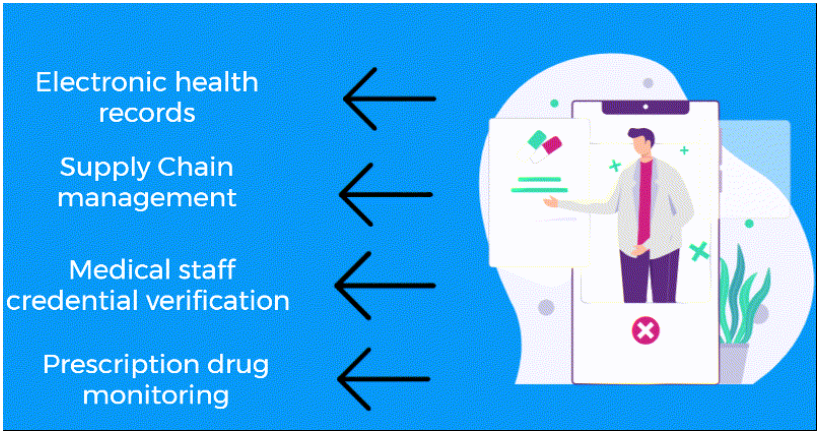Role Of Blockchain In Healthcare
As per Technavio’s analysis, the global blockchain technology in the healthcare sector is projected to experience substantial growth between 2022 and 2027, with an estimated increase of USD 1,939.31 million. The compound annual growth rate (CAGR) during this forecast period is expected to be an impressive 32.79%. Notably, North America dominated the market in 2022, holding the largest market share, and it’s foreseen to continue its expansion with an anticipated incremental growth of 46%. For a more comprehensive understanding, historical market data from 2017 to 2021 and the forecasted market size from 2023 to 2027 can provide further valuable insights into this dynamic market.(Newswire, 2023)
-
What is the problem in the traditional healthcare system?
The traditional healthcare system faces significant challenges, including high costs, limited accessibility, fragmented patient data, poor system interoperability, administrative inefficiencies, variable care quality, and healthcare workforce shortages. It tends to prioritize treatment over prevention, leading to higher long-term expenses. Patient involvement in decision-making is often limited, resulting in disparities in healthcare quality and access. Moreover, the traditional system lacks comprehensive interoperability. Health care blockchains are anticipated to promote nationwide data compatibility, enabling collaborative healthcare, improving precision medicine research, and ensuring prescription authenticity.
-
How to use Blockchain in the HealthCare Sector?
Blockchain’s distributed ledger technology enhances the secure sharing of patient medical records, bolsters the security of healthcare data, optimizes the management of the medicine supply chain, and aids healthcare researchers in deciphering genetic codes.
-
What are the Features of blockchain in the healthcare sector?
Data Security and Supply Chain Integrity
Blockchain offers secure, transparent storage for sensitive medical data, building trust in healthcare. It tracks the supply chain, preventing counterfeit drugs and ensuring authenticity.
Interoperability
It establishes a standardized format for data exchange, promoting interoperability and seamless communication among healthcare systems.
Patient Control
Patients have greater control over their medical data, granting or revoking access as needed, enhancing privacy and consent management.
-
Use cases of blockchain in healthcare sector:

Electronic Health Record (EHR)
Electronic health records (EHR) in healthcare face data security challenges due to centralized storage. Blockchain offers a decentralized, secure alternative to protect patient data from hacks. Startups like Medical-chain and Patientory are pioneering blockchain EHR solutions, empowering patients to manage and secure their health records, potentially enhancing care, cost-efficiency, and data protection.
Supply Chain management
The healthcare industry uses blockchain technology to secure the global supply chain, using technologies like RFID and EPCIS to track drug origins and prevent counterfeit products. Companies like Chronicled use blockchain and IoT to monitor real-time movement of medical supplies, enhancing supply chain security and allowing authorized individuals to access essential resources.
Medical staff credential verification
This technology verifies the credentials of a vast number of medical professionals in the US. With over a million licensed physicians, blockchain offers a fast and secure way to validate their qualifications and experience. It also creates a permanent record, enabling the tracking of medical staff’s career history. This blockchain-based credential verification is increasingly crucial for maintaining high-quality healthcare standards.
Prescription drug monitoring
Blockchain is employed in monitoring prescription drugs to combat misuse. It securely records each drug dispensing, aiding authorities in tracking drug movements and identifying misuse patterns. It also verifies patient and doctor identities, safeguarding prescription drug access for authorized individuals.
-
What are the Challenges of Blockchain Implementation in the Healthcare Sector?
Blockchain adoption in healthcare encounters hurdles, including compliance with strict data privacy regulations like HIPAA, which needs alignment with blockchain practices. While blockchain ensures security, it limits scalability, necessitating architectural enhancements or data partitioning solutions. The substantial volume of medical data can surpass blockchain capacity, urging well-thought-out storage architectures that combine on and off-chain approaches.
-
What is the Future of Blockchain in the Healthcare sector?
To remain technologically current in the digital era, healthcare organizations should make informed investments in blockchain, as it holds to reshape healthcare delivery. Blockchain has the potential to enhance patient care, cut costs, and strengthen data integrity. However, challenges and regulatory compliance must be effectively managed to realize its full potential. The widespread adoption and impact of blockchain in healthcare hinge on addressing these issues, making it a promising force for the industry’s future.
Our analyses indicate that blockchain technology is well-positioned to play a transformative role in the healthcare sector, with expectations of substantial growth and impressive CAGR projections.